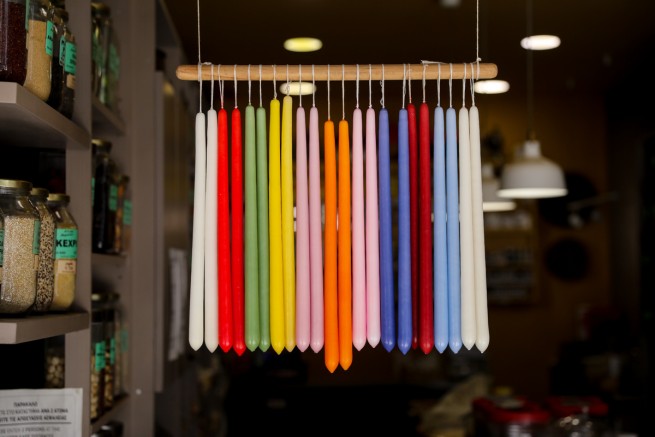It is possible that the delicate and delicious-tasting halloumi cheese (χαλούμι) is able to resolve a long-term geopolitical conflict.
Marinos Kapsis, the owner of the Nicosian restaurant “And standing tu Dimitri” (Portico of Dimitri), says:
“Halloumi is a very special product. Unlike other cheeses, it can be boiled, fried and grilled. You can also eat fresh halloumi, with fruit or in a salad. Halloumi is our tradition. A tradition that goes back many years and centuries ”.
The EU has awarded Halloumi the most prestigious quality mark – Protected Designation of Origin (PDO). This status will take effect in October, and in the European Union it will be possible to sell cheese called halloumi, only produced in the Republic of Cyprus.
This unique product is an important element of Cypriot exports. About 20 thousand people are employed in its production. And the assigned European status, says Marios Constantinou, Managing Director of the Haralabidis Christies factory, which produces 10,000 tonnes of halloumi per year, will further strengthen its position in the market:
“This status provides full protection of the name in the territory in which it operates. In this case, it is the European Union. This by itself will help us to further increase the export of halloumi to the EU countries, as well as to other countries of the world. “
But, as usually happens, not everyone on the island liked the prestigious status. Since 1974, Cyprus has been divided in two, into Greek and Turkish parts. The name of the famous local cheese was also divided: in the Turkish region it is produced under the name “helim” and exported under the same name.
Greek Cypriots are seriously afraid of competition, because labor and raw materials in the Turkish part of the island are cheaper, and sanitary and hygienic rules do not meet European standards. However, the Ministry of Agriculture of the Republic of Cyprus, according to the expert on agricultural policy Sokratis Socratus, does not object to the existence of two names:
“The cheese market is large enough that we believe it can accommodate both the Greek Cypriot haloumi and the Turkish Cypriot cheese. Of course, at first there will be a transitional period, during which our ministry will closely monitor the situation. If our producers need help, we will intervene. “
How do they comment on the issue on the other side of the UN dividing line? Turkish Cypriots cannot sell their cheese in the EU under any name. Difficult negotiations continue, and Hellym producers accuse Greek Cypriots of deliberately prolonging the situation.
The Gulgun Dairy Plant produces 65.5 tonnes of hellym per day, which is exported mainly to the Gulf countries and Turkey. Factory Export Director Ali Bayraktar says:
“Halloumi does not only belong to the north, south, east or west of Cyprus. Halloumi is a Cypriot cheese. It was made here before the Turks and Greeks. It doesn’t matter in which part of the island it is produced. Hallumi is hallumi. In northern Cyprus, about 50-60 thousand people are employed in its production. As soon as we start selling it in the EU, that number will double. There will be more jobs and the income of cheesemakers will increase, maybe double or triple, because the European market is very lucrative. “
The Turkish Cypriot Chamber of Commerce is negotiating with the Republic of Cyprus and the European Union, representing the interests of 4.5 thousand local companies, of which 25% are engaged in agriculture and food industry. Turgai Deniz, chairman of the chamber, notes that they want understanding from potential trading partners:
“In our Chamber of Commerce, we believe that for the successful completion of negotiations with the European Union, we need to create adequate monitoring mechanisms. We are persistently seeking cooperation from the EU with Hellim producers in order to solve their problems and bring their production in line with the sanitary and hygienic and other standards of the European Union. “
The new status of cheese in the European Union has raised concerns among herders in Cyprus. Now 80% of the cheese consists of cow’s milk. But by 2024, in accordance with the use of the protected name, cheesemakers will be required to produce cheese according to old recipes, at least 51% from sheep and goat milk. Because of this, dairy farms such as Andreas Kailas & sons ltd., Which produces 4,000 liters of cow’s milk every day, have found themselves in a quandary and crying out for a flexible approach. Andreas Kailas, owner of the farm, is convinced:
“The protected name Halloumi does not match the current market demand. Customers are looking for sliced haloumi, chili flavored haloumi, burger haloumi … All of these products do not comply with the Protected Name Rules. Our government and the EU must change these rules in response to market demand. ”
On the other hand, businessmen see only the positive aspects of the new status of cheese, both for themselves and for consumers. After all, the latter will more readily buy a product of guaranteed quality. Filippos Philipou, owner of Nut Nuts etc in Nicosia, offers halloumi as a valuable delicacy, for example:
“Halloumi performs an ambassador mission for Cyprus. Tourists will take a piece of halloumi with them and preserve the taste of our island forever. Halloumi will leave the longest memory for tourists upon their return home. ”
And Nicosian chef Marinos Kapsis is optimistic:
“Of course, halloumi in northern and southern Cyprus are different. But they also have something in common. And in both parts of the island he is loved equally. If he can help build bridges between the two parts, that will be very good. “






More Stories
Greece: growth in deposits from households and businesses in March 2024
How much will it cost a Greek family to celebrate Easter?
EU employment record: Greece "stuck" in a low position